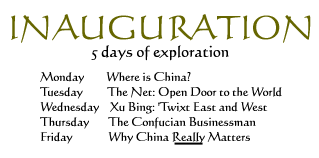
The Internet: China's New 'Open Door' to the World
by Jonathan Landreth, Executive Business Editor
Last month, Wu Jichuan, China’s powerful head of the Ministry for Information Industry, gave an interview to a reporter for the Financial Times of London in which he bluntly announced that all foreign investment in China’s booming Internet industry was barred. That came as a shock to innumerable foreign investors in Internet projects all over China, including prominent Western media companies like Dow Jones, News Corp., AOL, and Yahoo.

"Even if your envoy were able to acquire the rudiments of our civilization you could not possibly transplant our manners and customs to your alien soil. Therefore, however adept the Envoy might become, nothing could be gained thereby."
|
In Wu’s announcement, followers of Chinese history could hear the distinct echo of a letter written by the Chinese Emperor, Qian Long, in 1793, to King George III of Britain, conveyed to His Majesty by a trader with the British East India Company. On the King's behalf the trader had proposed expanded trading activity between England and China. "Even if your envoy were able to acquire the rudiments of our civilization," the Emperor wrote the King, "you could not possibly transplant our manners and customs to your alien soil. Therefore, however adept the Envoy might become, nothing could be gained thereby."
Few people on either side of the Pacific doubt that the Internet is unstoppable. And that’s precisely what makes the Internet unique among all the imports from the West that have flowed into China: before, the flow could be stopped by Imperial edict. Now there is literally no way that the bounty of the Internet can be stopped from flooding into China. How will China react?
The reaction has already started in the revival of a debate in contemporary China that raged a hundred years ago: how to continue thinking like Chinese while at the same time adopting Western practices – the balancing act of "zhong xue wei ti, xi xue wei yong."
What makes the Internet a different sort of door to the West, to be kept closed by Beijing for as long as it can hold it shut, is that those who pass through the virtual portals don’t physically intrude into China’s space. Foreign intrusion no longer comes in on a ship and sets up a concession. Rather it puts ashore in the Chinese mind via Microsoft’s Internet Explorer browser software.
Picture the open door of Internet as a swinging saloon door from the American West. Beijing can see Jerry Yang’s head over the top of the door – and it’s Chinese. When Yang pushes the slatted panels to swinging the door open, the Chinese may discover this cowboy has an American heart.
That's all right, but when the other young Chinese take Yang’s message to heart there’s a great danger, as Beijing must see it, of these native Chinese rising up and screaming ‘Yahoo!’ down the capitalist road. It will be very difficult to stop the exchange of culture and ideas over the Internet between China and the West. Some parents in China fear that their children aren’t learning proper Chinese because they spend so much time chatting online – in English.
It's just the beginning of the new, Internet-inspired debate within China over how to "think Chinese, while using Western practices." As for how that debate will turn out – and especially to determine what further steps Beijing might take to insure that the Internet in China remains a Chinese space – it's worth a look back at how this same debate has played out earlier in the century.
Continued
|



